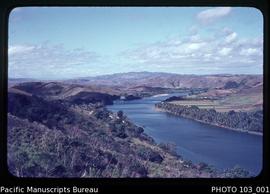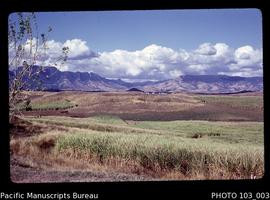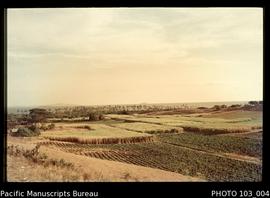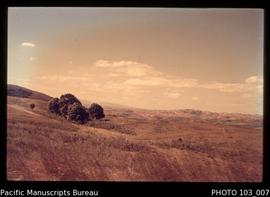Identity area
Reference code
AU PMB PHOTO 103
Title
Date(s)
- 1966 (Creation)
Level of description
Collection
Extent and medium
183 digital images
Context area
Name of creator
Biographical history
Since 1966 Robert Norton’s major area of research has been ethnicity and politics in Fiji. His PhD thesis, Politics, race and society in Fiji, was submitted at Sydney University in 1972. His book, Race and Politics in Fiji, was published by the University of Queensland Press in 1977 and a revised second edition was published in 1990. He was appointed as one of the foundation members of staff in the Department of Anthropology at Macquarie University in 1969. He continued to be a consistent observer and respected commentator on Fiji politics throughout his academic career, writing many essays and articles on politics in Fiji in scholarly journals and books.
Repository
Archival history
Immediate source of acquisition or transfer
Content and structure area
Scope and content
This collection of slides and photographs was taken by Robert Norton on his first research trip to Fiji, which took place during the 1966 Legislative Council elections campaigning.
The general Legislative Council elections were held in late 1966, just over a year after the first constitutional conference in London, and five years after the British government announced its plan to prepare Fiji for self-government.
The indigenous Fijian leaders were initially very anxious about this objective, viewing it as a threat to the protection they believed the Fijians had enjoyed under the colonial government’s policies, based in part, on the government’s interpretation of the Deed of Cession by which nearly 100 years before the leading chiefs had entrusted the islands to the British crown.
The Fiji Indians who in the 1960s were 51% of the population, and generally more advanced economically than the Fijians (43% of the population), looked favourably on the prospect of an end to colonial rule and their principal leaders called for a common franchise to replace communal (ethnic) political representation. The very influential but tiny European minority, concerned to preserve their longstanding privileged political representation, stood with the Fijians against radical constitutional change.
The 1966 elections were the first in which broadly-based political parties competed for a substantial power in the colonial parliament. The 1965 constitutional conference had changed the parliament (legislative council) from a council dominated by colonial officials appointed by the governor, to one dominated by elected representatives: 14 Indigenous Fijians, (2 elected by the Great Council of Chiefs), 12 Indians, 10 General electors (Europeans, Part-Europeans, Pacific islanders other than Fijians, and Chinese). The new constitution completed the expansion of the vote to a universal franchise, begun in 1963. Only four seats were reserved for colonial officials.
Most of the electorates remained ethnically defined, and all the seats remained ethnically reserved.
But overlaying the many communal electorates, were now three very large Cross Voting electorates covering the entire colony. They were multi-ethnic, made up from the communal electorates, and each had three reserved seats: Fijian, Indian, and General. The electors were entitled to four votes - one in their communal electorate, and three in their cross-voting electorate. Voting was not compulsory, and to cast a valid vote an elector need tick only the communal seat ballot paper if they wished. Communal seats numbered 9 Fijian, 9 Indian, and 7 General; there were 3 Fijian, 3 Indian, and 3 General cross-voting seats. Indigenous Fijians enjoyed additional representation by the two Council of Chiefs members of the parliament.
The intention of introducing the cross-voting electorates was to give people experience in supporting candidates of different ethnic identities from their own - a step, the British said, toward an eventual common franchise without reserved seats. It was hoped that political parties would each field candidates of different ethnicity, and that these would campaign together - the communal candidates assisting the campaigning of their cross-voting partners.
Some of the slides and photos illustrate this joint campaigning in western Viti Levu, by Fijian, Indian, and General candidates of the Alliance Party. All the pictures were taken on Viti Levu, Fiji’s major island.
The Alliance Party, whose main component body was the indigenous Fijian Association, won 22 seats (12 Fijian, 3 Indian, 7 General). The Federation Party (later the National Federation Party) secured only the 9 communal Indian seats; the party fielded only one non-Indian candidate, Fijian cane farmer Penaia Rokovuni (photos 48-54). Three General candidates were elected as independents.
References
Robert Norton 'Race and Politics in Fiji', University of Queensland Press, 1977, revised edition 1990
Roderick Alley 'The Emergence of Party Politics'. In 'Politics in Fiji' edited by Brij Lal, Allen & Unwin, 1986. Pp28-51
Appraisal, destruction and scheduling
Accruals
System of arrangement
As arranged by Dr Robert Norton
Conditions of access and use area
Conditions governing access
Available for reference
Conditions governing reproduction
Language of material
Script of material
Language and script notes
Physical characteristics and technical requirements
See individual items
Finding aids
Allied materials area
Existence and location of originals
Dr Robert Norton, Sydney, NSW
Existence and location of copies
Access this title at PMB Member Libraries or by contacting the Bureau directly: http://asiapacific.anu.edu.au/pambu/accessing.php
Related units of description
Notes area
Note
See Finding Aid for detailed descriptions by Dr Robert Norton
Alternative identifier(s)
Access points
Subject access points
Place access points
Name access points
Genre access points
Description control area
Description identifier
Institution identifier
Rules and/or conventions used
Dates of creation revision deletion
Language(s)
Script(s)
Sources
Finding Aid and Scope & Content written by Dr Robert Norton, drawing on the following sources: Robert Norton 'Race and Politics in Fiji', University of Queensland Press, 1977, revised edition 1990 and
Roderick Alley 'The Emergence of Party Politics'. In 'Politics in Fiji' edited by Brij Lal, Allen & Unwin, 1986. Pp28-51
Archivist's note
Minor dust removal on derivative files using Adobe Lightroom
Uploaded by Kari James, 11 October 2018
Digital object metadata
Filename
Digital_reference_image.pdf
Latitude
Longitude
Media type
Text
Mime-type
application/pdf










